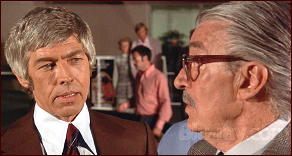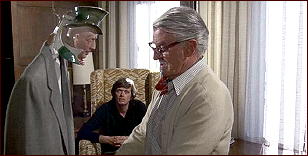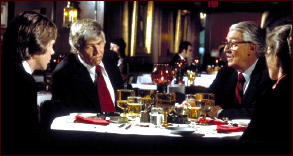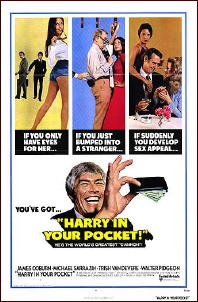Sun 16 Jul 2017
A Movie Review by Jonathan Lewis: HARRY IN YOUR POCKET (1973).
Posted by Steve under Crime Films , Reviews[12] Comments

HARRY IN YOUR POCKET. United Artists, 1973. James Coburn, Michael Sarrazin, Trish Van Devere, Walter Pidgeon. Music by Lalo Schifrin. Producer-Director: Bruce Geller.
Bruce Geller is best known for his work on the television series Mannix and Mission: Impossible. He also directed one feature film: Harry in Your Pocket, an offbeat study of the lives and times of a coterie of high-end pickpockets as they make their way from Seattle to Victoria, British Columbia, and eventually to Salt Lake City. Filmed on location, the movie defies easy categorization.

With a prominent score by Lalo Shifrin, one that occasionally overwhelms what’s happening on screen, the film at times seems to be as much a musical as a crime drama. At the end of the day, the movie is best understood as a drama, even a tragedy. It’s a study of human frailty and character flaws, wrapped up in a package with the words “quirky crime film†written in black marker.
The plot. Harry (James Coburn) is a pickpocket, living a luxuriously itinerant life on other people’s money and credit cards. Joining him for the proverbial ride is Casey (Walter Pidgeon), an aging pickpocket with a cocaine habit.

They eventually join forces with Ray (Michael Sarrazin), an ambitious young pickpocket, and his girlfriend Sandy (Trish Van Devere). Soon, however, each of the gang’s personal flaws begins to take a toll on the group’s cohesion. Harry’s too rigid and is a womanizer. Casey has a drug habit and is ashamed that he is no longer as steady on his feet as he used to be. Ray is too ambitious for his own good and becomes increasingly jealous of Harry’s infatuation with Sandy. And Sandy. She’s the linchpin in all this. Even Harry says that he thinks she’s going to be trouble.

While it’s not what I would call an excellent film, Harry in Your Pocket is a quite captivating work. It’s subtle and Coburn puts in a solid performance. It’s Pidgeon, however, in one of his last leading roles, that made the most memorable impression on me. Look for the scene in which he is instructing Ray on the “art†of being a pickpocket. He reminisces about the good old days before mugging, when pickpockets took their craft seriously and there was a code and honor in the “profession.â€
It’s that sense of melancholy and nostalgia that stayed with me. A product of the 1970s, Harry in Your Pocket could be easily interpreted as an extended cinematic metaphor for the generational divide in early 1970s American society.

July 16th, 2017 at 7:11 pm
It’s a remarkably nuanced film only marred by the fact the young leads are no match for Coburn and Pidgeon, the latter giving an Oscar worthy performance as Casey.
Quirky to say the least, but also elegiac even if for a breed of romanticized criminal even the film admits is more nostalgia than fact.
It is a favorite film, but one hard to put in any one slot other than vaguely a crime film because it does reveal so much pickpocket lore.
July 16th, 2017 at 8:11 pm
Jon is correct in saying that Sandy is the linchpin to the story, but Walter Pidgeon as Casey was the standout actor in the film, without question.
It’s a movie that grows on you, or at least it has me. I wasn’t sure what to make of it while I was watching it, but there are scenes in it that will stick with me for a while.
July 16th, 2017 at 9:41 pm
If one is to describe James Coburn’s career you would use the work “quirky.” From the Flint films to this film to lesser known film BALTIMORE BULLET no one was better as the odd off-beat lead character than Coburn.
July 16th, 2017 at 10:08 pm
I enjoyed his performance in this one, perhaps he was lower in key than usual — but by no means dull. His character had quirks, and this made Coburn perfect for the part.
July 16th, 2017 at 9:51 pm
An excellent review of what would be an excellent film if you ‘take Michael Sarrazin’ away. Far — like to another world. Walter Pidgeon dominates in support, and that takes something. Authority and experience. If these clever characters led by Harry had entered a legitimate enterprise, the world would have been theirs.
July 16th, 2017 at 10:12 pm
Amen to that, Barry.
And, yes, Michael Sarrazin was the weak link. The big problem I had early on in the film was, well, there were two: what did Sandy see in him, and why did Harry agree to take them both on? After a while, the answer to the second question became clear. It was Sandy.
July 17th, 2017 at 1:06 am
Fun Fact:
The working title of this picture was Harry Never Holds – which, you’ll recall, was Harry’s Law: once he got the wallet, he laid it off immediately on one of the other crew members.
I suppose I should have tagged this with a Spoiler Warning, shouldn’t I?
Ah well …
July 17th, 2017 at 7:31 am
Mike
Here’s another SPOILER. One drawback to the way the story is told is that as soon as you hear that Harry’s motto is “Harry Never Folds,” you just know…
July 17th, 2017 at 9:35 pm
Barry,
Though Sarrazin is in a few films I like, he marred the entire era of films he appeared in. Someone should CGI his movies and put a less annoying actor in them.
July 18th, 2017 at 12:18 am
Yet another movie I saw at the Port Hueneme military base theater for $1. Dad took me. The second feature was “Sidecar Racer”.
Looking at imdb, maybe Harry was the second feature.
That’s where he took me to see “The Sting”.
Cons. Pickpockets. Dad reared me right.
July 18th, 2017 at 10:33 am
David,
Laugh out loud funny and spot on. Thanks for the thought.
November 26th, 2020 at 3:53 pm
[…] Several years ago Jonathan Lewis contributed a Mystery*File article about producer/creator Bruce Geller’s directorial involvement with Harry in Your Pocket (1973), an offbeat crime film, and you can read that here. […]